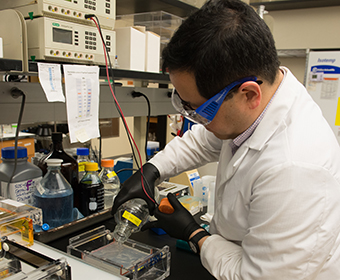Record number of UTSA students earn NSF fellowships

(April 10, 2017) -- Five students from The University of Texas at San Antonio (UTSA) will receive the 2017 National Science Foundation (NSF) Graduate Research Fellowship, the largest number of UTSA students ever to receive the honor in one year.
The distinguished fellowship is awarded to outstanding graduate students in NSF-supported science, technology, engineering, and mathematics disciplines who are pursuing research-based master's and doctoral degrees at accredited United States institutions. Three of the five UTSA students received the award while completing their undergraduate degrees at UTSA.
One of UTSA's recipients is Jasmine King, who graduates from UTSA in May with her bachelor's in biomedical engineering. The San Antonio native transferred to UTSA for the academic opportunities.
"Transferring to UTSA was the best career move I've made," said King. "The MARC-U*STAR program changed my life by introducing me to biomedical research. This has given me the most competitive edge for other research experiences while sharpening my professional skills."
King is developing a silk-based scaffold system to support pancreatic acinar, which could help fight pancreatitis. She'll build on her UTSA education this fall when she attends the joint UC Berkeley/UC San Francisco Graduate Program in Bioengineering.
"The NSF Fellowship is a huge honor and it's highly competitive," said Gail Taylor, assistant director of UTSA's Maximizing Access to Research Careers - Undergraduate Student Training for Academic Research (MARC U*STAR) and Research Initiative for Scientific Enhancement (RISE) programs. "It's a sign that UTSA is developing more and more as a top-tier research institution."
NSF Fellows receive a three-year annual stipend of $34,000 while their universities receive a $12,000 cost of education allowance to cover tuition and fees. They also receive international research opportunities, professional development opportunities and the freedom to conduct research on a topic of their choosing at the accredited U.S. institutions where they enroll.
Biology senior and MARC participant Madeline Cortez is another UTSA NSF Fellow.
"As a freshman, I had no idea what I wanted to do with my biology degree," said Cortez. "As soon as I joined a lab, I knew it was the place for me. I received both technical and professional training at UTSA."
Cortez is working alongside Floyd L. Wormley Jr. to create an anti-fungal vaccine that can protect healthy individuals and those who do not have fully functioning immune systems. After she graduates in May, the San Antonio native will pursue her doctoral degree at Baylor College of Medicine in Houston in the Molecular Virology and Microbiology program.
Jason Giuliani is pursuing his Ph.D. in physics at UTSA after graduating with his bachelor's in 2016. MARC and RISE helped Giuliani develop his research in Carlos Monton's laboratory. He will continue that work, which consists of using electrochemistry and physical methods to create arrays of magnetic, multi-compositional nanowires and nanostructures, with help from the NSF Fellowship.
"This honor means everything to me," Giuliani said. "UTSA has played an instrumental role in making it a reality."
Other UTSA NSF Fellows include undergraduate biomedical engineering student Alisa Isaac and Christian Sheumaker, a UTSA graduate student in archaeology.
"We have some amazing students at UTSA. They're competitive at just about any school in the nation but they choose to come here," said Taylor. "What's unique about UTSA is the depth of training undergraduates receive in our labs. These students are getting the research experience usually not obtained at other universities until graduate school."
Taylor's tells other student researchers at UTSA, "Aim high because at UTSA you can reach it. You can get the research you need, touch the community and develop as a leader."
UTSA is ranked among the top 400 universities in the world and among the top 100 in the nation, according to Times Higher Education.
-------------------------------
Learn more about the degree progrms offered at UTSA.
Learn more about the UTSA MARC-U*STAR and RISE programs.
Learn more about UTSA Research.
Connect with UTSA online at Facebook, Twitter, YouTube, Instagram and LinkedIn.
Events
Move-in Day is an exciting time for incoming students. Students living in Laurel Village move in on August 22. The UTSA Housing and Residence Life (HRL) team looks forward to welcoming you all and helping you settle into your room.
Laurel VillageThe College of Sciences welcomes our newest Roadrunners to UTSA at VIVA Science! This interactive event connects students with faculty, staff, student leaders, and peers while highlighting the opportunities available across the College.
Outdoor Learning Environment 2 (OLE), Flawn Building, Main CampusWe're excited to welcome the new class of UTSA College of Liberal and Fine Arts (COLFA) students to campus! Move In To COLFA is strongly recommended for new students in COLFA because it gives you the chance to learn about the Student Success Center, learn how to do college successfully and meet new friends.
Galleria (MH 2.01), McKinney Humanities Building, Main CampusBuild connections with your Alvarez College of Business peers and learn more about the Career Compass program! This opportunity will provide fun interactions, giveaways and a chance to meet your next friend!
Richard Liu Auditorium (BB 2.01.02,) Business Building, Main CampusCelebrate the end of summer and the start off a great fall semester with The Housing Block Party! This event will have live music, carnival-style treats, artists, games, and activities galore. Come and join us for a night of fun!
Multipurpose Room/Lawn, Guadalupe Hall, Main CampusBe part of an unforgettable night as SOSA takes the field for its first public performance of the season! Experience the power, pride, and pageantry of UTSA’s marching band. Learn beloved traditions, practice cheers, and feel what it means to be a Roadrunner.
Campus Rec FieldsAfter getting your student settled in their room, connect with other UTSA families at our Family Get Together. Attendees need to RSVP for the event.
Rock & Brews Restaurant - 5702 Landmark Pkwy, San Antonio, TX 78249

